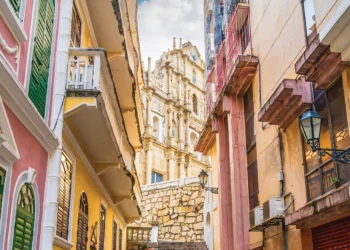With concerns over large gatherings of people essentially shutting down the world’s casino industry, a new camera system that combines facial recognition with temperature detection could provide a long-term solution.
An invisible enemy is currently depriving people of their daily lives and causing mass disruption to the global economy. We are facing a dilemma in which the more effective countermeasures to COVID-19 are, the more stagnant the economy becomes.
And for the gaming industry, the virus prevents the one thing operators, suppliers and other stakeholders rely on above all else – the smooth flow of people.
Ironically, a product that may help in enabling this very activity was released just last month by Japanese firm Cathay Tri-Tech, Inc, a subsidiary of Thine Electronics. The Thermo Camera System is a temperature sensor already deployed to a number of high-rise office towers in Tokyo and at the construction sites of major general contractors.
 The technology, which combines facial recognition and temperature detection, was developed by a Chinese AI startup, YITU Technology, which has forged a strong global reputation for its facial recognition technology.
The technology, which combines facial recognition and temperature detection, was developed by a Chinese AI startup, YITU Technology, which has forged a strong global reputation for its facial recognition technology.
As a countermeasure to COVID-19, combining facial recognition with temperature detection can quickly weed out those with a fever. What makes all of this possible is two eye-shaped cameras – a full high-definition camera for facial recognition and a thermographic camera for measuring temperature that focuses on the forehead. The technology is even advanced enough to provide a certain level of accuracy in recognition when the target is wearing a face mask.
The Thermo Camera System can take the temperature of up to 16 people simultaneously, and takes between 0.03 and 0.1 seconds to do so, allowing for a smooth flow of employee and guest traffic. A thermometer that emits infrared rays is used, measuring the difference in body temperature with an accuracy of within 0.3 degrees Celsius.
A representative of the company told IAG, “Those infected with COVID-19 always present with a fever, so quick detection of fevers in places that attract crowds and separating these people is important. The combination with facial recognition means that those with a fever can be identified and tracked.”
Using a high-rise office building in Tokyo as an example, the standard body temperature setting according to government experts is 37.5 degrees Celsius. If someone with a fever exceeding that level passes by, an alarm sounds and the person is refused entry into the building.
“We are getting inquiries from hotels, hospitals, train stations and airports, as well as large sports stadiums where baseball and soccer events take place,” the company explained. “We have already taken orders for some of these locations.”
There is increasing demand for facial recognition systems in the world’s IRs as a “barrier” for problem gambling. It is almost certain that the COVID-19 crisis will end sometime, but the aftermath will undoubtedly be a higher level of concern for security and safety, which will lead to a race of ideas between suppliers for this sort of innovation.

































